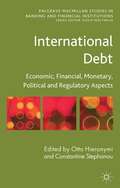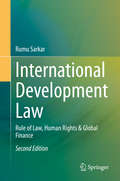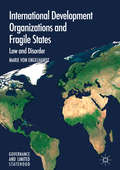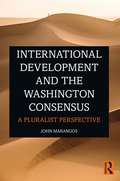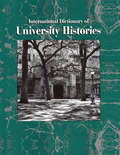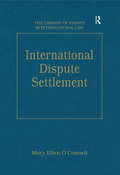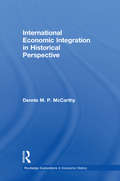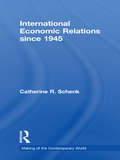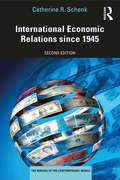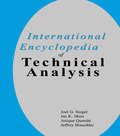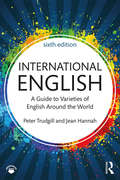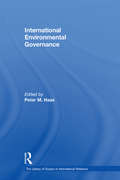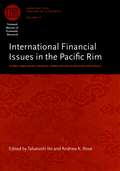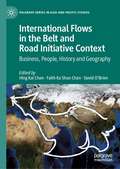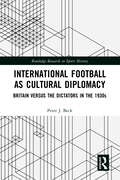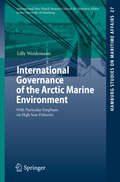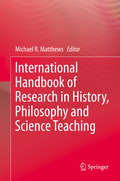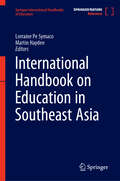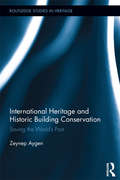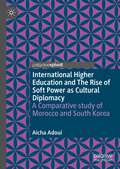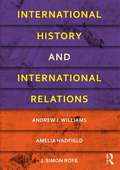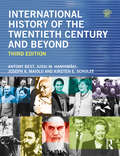- Table View
- List View
International Debt
by Otto Hieronymi Constantine A. StephanouWritten by a group of international experts, this book focuses on three interdependent themes: (a) origins and consequences of the current debt crisis; (b) the systemic nature of the crisis; (c) national and international policy efforts to avoid a global collapse and bring about lasting reforms in the Euro zone and in the financial system.
International Development Law: Rule of Law, Human Rights & Global Finance (International Economic Development Law Ser. #Vol. 14)
by Rumu SarkarThis book describes how international development works, its shortcomings, its theoretical and practical foundations, along with prescriptions for the future. International Development Law provides the reader with new perspectives on the origins of global poverty, identifies legal impediments to sustainable economic growth, and provides a better understanding of the challenges faced by the international community in resolving global poverty issues. The text is structured into two basic parts: the first part deals with the theoretical and philosophic foundations of the subject, and the second part sets forth issues relating to the international financial architecture, namely, international borrowing practices, privatization, and emerging economies. In particular, the book provides new, innovative analysis on corruption as an impediment to sustainable development. The three interlocking facets of corruption are examined: transnational organized crime, Islamic-based international terrorism, and corruption within emerging economies and the international banking system. Thus fresh new analysis adds depth and clarity to a field that heretofore has been scattered and superficial. Finally, the “right to development” within the international human rights discourse is critically reviewed, particularly in light of new jurisprudence emerging from the African context.This book offers a fresh, new and balanced legal perspective on the development process. The text has been rigorously researched and has many practical facets based on the author’s professional experience within the international development field. It is an invaluable research and teaching tool since it takes a multidisciplinary approach to putting complex issues, legal trends and political questions into a clear, new perspective that is highly analytical as well as accessible to the reader. The author's elegant legal prose is both powerful and persuasive.
International Development Organizations and Fragile States
by Marie Von EngelhardtThis book addresses a conundrum for the international development community: The law of development cooperation poses major constraints on delivering aid where it is needed most. The existence of a state with an effective government is a basic condition for the transfer of aid, making development cooperation with 'fragile' nations particularly challenging. The author explores how international organizations like the World Bank have responded by adopting formal and informal rules to engage specifically with countries with weak or no governments. Von Engelhardt provides a critical analysis of the discourse on fragile states and how it has shaped the policy decision-making of international organizations. By demonstrating how perceptions of fragility can have significant consequences both in practice and in law, the work challenges conventional research that dismisses state fragility as a phenomenon beyond law. It also argues that the legal parameters for effective global policy play a crucial role, and offers a fresh approach to a topic that is central to international security and development.
International Development and the Washington Consensus: A Pluralist Perspective
by John MarangosIn this book, John Marangos offers an insightful analytical and theoretical review of the Washington Consensus and its successors among the mainstream. Following an intuitive structure, it explores international development and the Washington Consensus, as a critique through the lenses of Neoclassical economics, Post Keynesian economics, Institutional economics, and Marxist economics. Ultimately, it provides a compelling alternative perspective to the dominant development paradigm, and enables readers to identify the interconnections, interrelationships, and intercontradictions between different frameworks and policies. It will be a valuable supplementary reading for students, researchers, and policymakers in international development, development economics, heterodox economics, and the history of economic thought.
International Dictionary of University Histories
by Carol Summerfield Mary Elizabeth DevineModeled on Fitzroy Dearborn's highly successful International Dictionary of Historic Places , the International Dictionary of University Histories provides basic information on 200 institutions--location, description, sources of further information--followed by an extensive 3000 to 5000 word essay on each university's history. Entries on each university conclude with a Further Reading list, and most entries are illustrated. Coverage is world-wide, and entries range from the great medieval institutions (Oxford, Heidelberg, the Sorbonne) to the great historic universities of the United States, to the newer universities of Australia and South Africa, to the lesser-known universities of India, China, and Japan. More than 200 writers, researchers and archival departments of the universities themselves have contributed to the Dictionary . Entries include those universities with the most fascinating histories and those that have played important roles in the development of their own countries and in the furtherance of world scholarship.
International Dispute Settlement
by Mary Ellen 0' ConnellThe very purpose of international law is the peaceful settlement of international disputes. Over centuries, states and more recently, organizations have created substantive rules and principles, as well as affiliated procedures, in the pursuit of the peaceful settlement of disputes. This volume of the Library of Essays in International Law focuses on the classic procedures of peaceful settlement: negotiation, good offices, inquiry, conciliation, arbitration, judicial settlement, and agencies for dispute resolution. The introduction provides a unique historic overview, explaining how the procedures first developed and changed over time. Each chapter features a seminal essay that helped create the changes described in the introduction. Being at the center of international law, dispute resolution has always been a core topic of international scholarship, this volume brings together for the first time, the pivotal writing in the field.
International Economic Integration in Historical Perspective (Routledge Explorations in Economic History)
by Dennis Patrick McCarthyInternational economic integration is not a recent phenomenon; its roots can be traced back to the Roman Empire. This informative volume departs from the conventional short-term analysis and takes a long-term view of the process, offering perspectives that are both detailed and diverse. Author Dennis McCarthy examines seven types of organizations that exemplify international economic integration (colonial empires, merchant associations, religious empires, criminal empires, free trade areas, customs unions and common markets), and representative examples of each type are analyzed in a comparative framework. Timely and unique, this book demonstrates that international economic integration is an economic and political process that also involves political economy. With an introduction defining key terms and concepts; a retrospective summarizing the main insights, and endnotes and a detailed bibliography offering readers ways to pursue these topics further, McCarthy’s book will prove indispensable to students and general readers who wish to gain a firm understanding of international economics and the processes that shape the world today.
International Economic Relations since 1945
by Catherine R. SchenkThe international economy since 1945 has endured dramatic changes in its balance of power, from the early period of prosperity for industrialised nations, to the 2008/9 global crisis. In this volume Catherine Schenk outlines these huge changes, examines how the world’s economic leaders have tried to organise and influence the international economy and presents the key frameworks in which international economic relations have developed. Focusing on the pattern of international trade, international investment and the changing organisation of the international monetary system, this volume takes a chronological approach of key time-frames, and shows how policy has impacted the balance of the international economy. Major events such as European integration in the 1960’s, the collapse of the international monetary system and oil crisis in the 1970’s the return of China to the international economy in the 1980’s and emerging market crises in the 1990s are discussed within the context of key themes including global economic and regulatory co-ordination, the role of American economic hegemony, the evolution of exchange rate policy and unequal development. International Economic Relations since 1945 is the perfect guide for all students of economic history and international history, and for those seeking to understand recent economic trends in a longer term perspective.
International Economic Relations since 1945 (The Making of the Contemporary World)
by Catherine R. SchenkThis second edition has been updated to include an assessment of economic relations up to the COVID-19 pandemic. It focuses on three main threads that tie national economies together: flows of goods, of people and of finance. Since the end of the Second World War, the international economy transformed from a tightly controlled trading system to the financial globalization of the late 20th century. This book traces the organisation of international economic relations from the 1944 Bretton Woods conference through to the 2008 financial crisis and its aftermath. By outlining the development of economic policy of both national and international institutions like the International Monetary Fund and the European Union, this volume examines how the global system was constructed and explores the sources of inequality and instability. The changing political context is also emphasised, especially the Cold War and its end, the rise of China and other emerging market economies and the prospect of a retreat from globalisation in the wake of the 2008 crisis. Using non-technical language and providing clear examples and evidence, the book is an accessible introduction to international economic relations that will be useful for all students of modern world history since 1945.
International Encyclopedia of Technical Analysis
by Jae K. Shim Joel G. Siegel Anique A. Qureshi Jeffrey BrauchlerInvestors are firmly entrenched in two camps: those who believe that economic and financial fundamentals are the keys to investment success, and those who prefer some form or other of technical analysis. To serve those who use technical analysis, the authors have written a practical, useful, and comprehensive guide to all the major and minor technical analysis systems used by today's investors and financial professionals. In this unique reference book, technical analysis systems are discussed in depth, with detailed attention to the pros and cons of each. In addition, the Encyclopedia offers a mini-dictionary of the terms, concepts, and market issues that are part of the discipline of technical analysis.
International English: A Guide to Varieties of English Around the World
by Peter Trudgill Jean HannahFrom Singapore to Scotland, Canada to the Channel Islands, Namibia to New Zealand and beyond, International English takes you on a fascinating journey through the varieties of English spoken around the world. Comparisons across the varieties provide a comprehensive guide to differences in phonetics, phonology, grammar and vocabulary, making this a useful resource for teachers of English as a foreign language and linguistics students alike. This sixth edition has been thoroughly updated to include the following: new sections on the Death of RP, Estuary English, Multicultural London English, the Dublin accent and Fijian English; updated material on RP phonology, New Zealand English phonology, Australian English lexis, North American English lexis and the Northern Cities Chain Shift; revised and updated references and bibliography. This textbook comes with free-to-download MP3 files at www.routledge.com/9781138233690, which demonstrate the different varieties featured in the book – ideal for use in class, at home or on the move. International English remains a key and indispensable resource for teachers and students, and is essential reading for anyone studying varieties of English in a global context.
International Environmental Governance (The\library Of Essays In International Relations Ser.)
by Peter M. HaasInternational Environmental Governance reviews the contentious approaches to addressing global and transboundary environmental threats. The volume collects together the most influential and important literature on the major political approaches to dealing with these problems, their histories, major debates, and research frontiers. It is accompanied by a substantial introduction which reviews the evolution of the academic contribution to environmental governance, focusing on a wide array of international environmental problems.
International Evidence on Recovery from Recessions
by Valerie Cerra Sweta C. Saxena Ugo PanizzaA report from the International Monetary Fund.
International Express: New Yorkers on the 7 Train
by William Kornblum Stéphane TonnelatNicknamed the International Express, the New York City Transit Authority 7 subway line runs through a highly diverse series of ethnic and immigrant neighborhoods in Queens. People from Andean South America, Central America, China, India, Italy, Korea, Mexico, Pakistan, Poland, Romania, and Vietnam, as well as residents of a number of gentrifying blue-collar and industrial neighborhoods, fill the busy streets around the stations. The 7 train is a microcosm of a specifically urban, New York experience, in which individuals from a variety of cultures and social classes are forced to interact and get along with one another. For newcomers to the city, mastery of life in the subway space is a step toward assimilation into their new home.In International Express, the French ethnographer Stéphane Tonnelat and his collaborator William Kornblum, a native New Yorker, ride the 7 subway line to better understand the intricacies of this phenomenon. They also ask a group of students with immigrant backgrounds to keep diaries of their daily rides on the 7 train. What develops over time, they find, is a set of shared subway competences leading to a practical cosmopolitanism among riders, including immigrants and their children, that changes their personal values and attitudes toward others in small, subtle ways. This growing civility helps newcomers feel at home in an alien city and builds what the authors call a "situational community in transit." Yet riding the subway can be problematic, especially for women and teenagers. Tonnelat and Kornblum pay particular attention to gender and age relations on the 7 train. Their portrait of integrated mass transit, including a discussion of the relationship between urban density and diversity, is invaluable for social scientists and urban planners eager to enhance the cooperative experience of city living for immigrants and ease the process of cultural transition.
International Fascism, 1919-45 (Totalitarianism Movements and Political Religions)
by Robert MallettThe essays that comprise this study of 20th-century fascism shift the focus away from the German and Italian models and towards the influence of fascist ideology within other countries.
International Financial Issues in the Pacific Rim: Global Imbalances, Financial Liberalization, and Exchange Rate Policy
by Takatoshi Ito Andrew K. RoseThe imbalanced, yet mutually beneficial, trading relationship between the United States and Asia has long been one of international finance's most perplexing mysteries. Although the United States continues to post a substantial trade deficit-- and China reaps the benefits of a surplus-- the dollar has yet to sink in the face of ever-increasing account disparities. International Financial Issues in the Pacific Rim explains why the United States enjoys a seemingly symbiotic relationship with its trading partners despite stark inequities in the trade balance, especially with Asia. This timely and well-informed study also debunks the assumed link between economic openness and low inflation in the region, identifies the serious gap between academic and private-sector researchers' understanding of exchange rate volatility, and analyzes the liberalization of Asian capital accounts.International Financial Issues in the Pacific Rim will have broad implications for global trade and economic policy issues in Asia and beyond.
International Flows in the Belt and Road Initiative Context: Business, People, History and Geography (Palgrave Series in Asia and Pacific Studies)
by Hing Kai Chan Faith Ka Shun Chan David O’BrienThis edited volume brings together a wide range of academics to engage with inter-disciplinary research perspectives in response to the development of The Belt and Road Initiative (BRI) which opens unparalleled opportunities to gain access to new markets in Asia, Europe and Africa. The collection examines opportunities offered in key areas such as trade and investment, policy coordination, facilities connectivity and cultural exchange. It also notably considers how the historical, environmental, cultural and political background to the BRI impacts this hugely ambitious plan which has been described as the ‘new Silk Road', as well as the challenges across these spheres in a part of the world which has witnessed much instability historically.
International Football as Cultural Diplomacy: Britain Versus the Dictators in the 1930s (Routledge Research in Sports History)
by Peter J. BeckDrawing on wide-ranging archival research, this authoritative new history examines the cultural diplomatic role played by British football in international affairs, British foreign policy, and international football during the 1930s. For British governments, soccer diplomacy emerged as a favoured instrument of soft power when facing Hitler’s Germany, Mussolini’s Italy, Hirohito’s Japan, and Stalin’s Russia on and off the field. Examining the evolving relationship between successive governments and the Football Association, this book records how governments, though publicly espousing the distinctive autonomy of British sport, pursued privately a progressively interventionist role regarding international matches played by England and Football League clubs. Embedding its central themes in the wider context of international relations, the war of ideas between the liberal democracies and the dictatorships, and international football, the book also interrogates one of the most shocking moments in British sporting history, when England players gave Nazi salutes in Berlin in 1938, an episode in which virtue signalling was used in support of footballing appeasement. Offering readers an informed historical perspective on some of the modern world’s most significant issues, from the divide between dictatorships and liberal democracies to the use of sport as cultural diplomacy aka cultural propaganda, this book is fascinating reading for anybody with an interest in the history of Britain, sport history, football, international politics, diplomacy or international institutions.
International Governance of the Arctic Marine Environment
by Lilly WeidemannThe Arctic is particularly affected by climate change; over the past few decades, temperatures in this area have risen twice as fast as the mean global rate. The most prominent effect of global climate change in the region is the melting sea ice in the Arctic Ocean, which enables a multitude of ocean uses to be initiated and extended, such as shipping, fishing and oil and gas extraction. Unlike in the Antarctic, there is currently no single comprehensive legal regime for governance of the Arctic. Instead, the region is regulated by a patchwork of international treaties, above all the United Nations Convention on the Law of the Sea (UNCLOS), various regional and sub-regional agreements, national laws and soft-law agreements. This treatise provides an evaluation of the governance regime that regulates the use of the Arctic marine environment and its readiness to protect these fragile ecosystems in light of the consequences of climate change.
International Handbook of Research in History, Philosophy and Science Teaching
by Michael R. MatthewsThis inaugural handbook documents the distinctive research field that utilizes history and philosophy in investigation of theoretical, curricular and pedagogical issues in the teaching of science and mathematics. It is contributed to by 130 researchers from 30 countries; it provides a logically structured, fully referenced guide to the ways in which science and mathematics education is, informed by the history and philosophy of these disciplines, as well as by the philosophy of education more generally. The first handbook to cover the field, it lays down a much-needed marker of progress to date and provides a platform for informed and coherent future analysis and research of the subject. The publication comes at a time of heightened worldwide concern over the standard of science and mathematics education, attended by fierce debate over how best to reform curricula and enliven student engagement in the subjects. There is a growing recognition among educators and policy makers that the learning of science must dovetail with learning about science; this handbook is uniquely positioned as a locus for the discussion. The handbook features sections on pedagogical, theoretical, national, and biographical research, setting the literature of each tradition in its historical context. It reminds readers at a crucial juncture that there has been a long and rich tradition of historical and philosophical engagements with science and mathematics teaching, and that lessons can be learnt from these engagements for the resolution of current theoretical, curricular and pedagogical questions that face teachers and administrators. Science educators will be grateful for this unique, encyclopaedic handbook, Gerald Holton, Physics Department, Harvard University This handbook gathers the fruits of over thirty years' research by a growing international and cosmopolitan community Fabio Bevilacqua, Physics Department, University of Pavia
International Handbook on Education in Southeast Asia (Springer International Handbooks of Education)
by Martin Hayden Lorraine Pe SymacoThis International Handbook provides a detailed account of the education systems of 11 Southeast Asian nations, including Brunei Darussalam, Cambodia, Indonesia, Lao People’s Democratic Republic, Malaysia, Myanmar, the Philippines, Singapore, Thailand, Timor- Leste, and Vietnam. It presents a systematic sector-by-sector explanation of how these national education systems deliver educational services and respond to national and international issues and challenges. With 56 chapters, the International Handbook is the region’s most comprehensive educational reference source. In the first of its chapters, the editors introduce the regional context and draw attention to the distinctive characteristics of each of the 11 systems. Southeast Asia, representing 8.5% of the world’s population, is as dynamic as it is diverse. The International Handbook charts progress and establishes a benchmark for documenting future developments. It also provides a stepping-off point for more detailed investigations of decision-making processes and outcomes across the 11 national education systems.
International Heritage and Historic Building Conservation: Saving the World’s Past
by Zeynep AygenThe majority of books in English on historic building conservation and heritage preservation training are often restricted to Western architecture and its origins. Consequently, the history of building conservation, the study of contemporary paradigms and case studies in most universities and within wider interest circles, predominantly in the UK, Europe, and USA focus mainly on Europe and sometimes the USA, although the latter is often excluded from European publications. With an increasingly multicultural student body in Euro-American universities and with a rising global interest in heritage preservation, there is an urgent need for publications to cover a larger geographical and social area including not only Asia, Australia, Africa and South America but also previously neglected countries in Europe like the new members of the European Community and the northern neighbour of the USA, Canada. The inclusion of the ‘other’ in built environment education in general and in building conservation in particular is a pre-requisite of cultural interaction and widening participation. International Heritage and Historic Building Conservation assesses successful contemporary conservation paradigms from around the world. The book evaluates conservation case studies from previously excluded areas of the world to create an integrated account of Historic Building Conservation that crosses the boundaries of language and culture and sets an example for further inclusive research. Analyzing the influence of financial constraints, regional conflicts, and cultural differences on the heritage of disadvantaged countries, this leading-edge volume is essential for researchers and students of heritage studies interested in understanding their topics in a wider framework.
International Higher Education and The Rise of Soft Power as Cultural Diplomacy: A Comparative study of Morocco and South Korea
by Aicha AdouiThis book offers a comprehensive analysis of international higher education and soft power as cultural diplomacy, through a study of Morocco and South Korea. It draws on extensive original research to explore the social, political, and economic factors that have shaped the international standing of both countries in terms of higher education. The research reveals the importance of higher education in promoting soft power and the role of international universities in enhancing the international reputation of a country. The book's key findings demonstrate the impact of soft power as cultural diplomacy on international relations and the contribution it makes to research in the field of international higher education.
International History and International Relations
by J. Simon Rofe Andrew J. Williams Amelia HadfieldThis innovative new textbook seeks to provide undergraduate students of international relations with valuable and relevant historical context, bridging the gap and offering a genuinely interdisciplinary approach. Each chapter integrates both historical analysis and literature and applies this to an international relations context in an accessible fashion, allowing students to understand the historical context in which these core issues have developed. The book is organised thematically around the key issues in international relations such as war, peace, sovereignty, identity, empire and international organisations. Each chapter provides an overview of the main historical context, theories and literature in each area and applies this to the study of international relations. Providing a fresh approach, this work will be essential reading for all students of international relations and international relations theory.
International History of the Twentieth Century and Beyond
by Joseph A. Maiolo Kirsten E. Schulze Antony Best Jussi HanhimakiThis hugely successful global history of the twentieth century is written by four prominent international historians for first-year undergraduate level and upward. Using their thematic and regional expertise, the authors have produced an authoritative yet accessible and seamless account of the history of international relations in the last century, covering events in Europe, Asia, the Middle East, Africa and the Americas. They focus on the history of relations between states and on the broad ideological, economic and cultural forces that have influenced the evolution of international politics over the past one hundred years. The third edition is thoroughly updated throughout to take account of the most recent research and global developments, and includes a new chapter on the international history of human rights and its advocacy organizations, including NGOs. Additional new features include: New material on the Arab Spring, including specific focus on Libya and Syria Increased debate on the question of US decline and the rise of China. A timeline to give increased context to those studying the topic for the first time. A fully revised companion website including links to further resources and self-testing material can be found at www.routledge.com/cw/best Antony Best is Associate Professor in International History at the London School of Economics. Jussi M. Hanhimäki is Professor of International History and Politics at the Graduate Institute of International Studies, Geneva. Joseph A. Maiolo is Professor of International History at the Department of War Studies, Kings College London. Kirsten E. Schulze is Associate Professor in International History at the London School of Economics.
